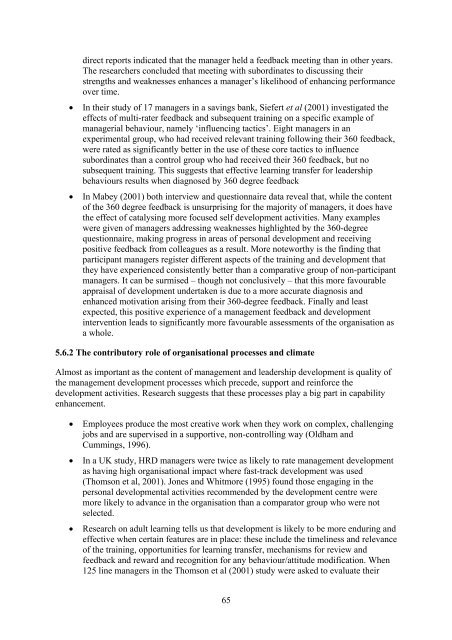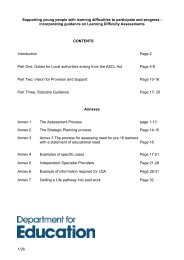The Development of Management and Leadership Capability and its ...
The Development of Management and Leadership Capability and its ...
The Development of Management and Leadership Capability and its ...
Create successful ePaper yourself
Turn your PDF publications into a flip-book with our unique Google optimized e-Paper software.
direct reports indicated that the manager held a feedback meeting than in other years.<br />
<strong>The</strong> researchers concluded that meeting with subordinates to discussing their<br />
strengths <strong>and</strong> weaknesses enhances a manager’s likelihood <strong>of</strong> enhancing performance<br />
over time.<br />
• In their study <strong>of</strong> 17 managers in a savings bank, Siefert et al (2001) investigated the<br />
effects <strong>of</strong> multi-rater feedback <strong>and</strong> subsequent training on a specific example <strong>of</strong><br />
managerial behaviour, namely ‘influencing tactics’. Eight managers in an<br />
experimental group, who had received relevant training following their 360 feedback,<br />
were rated as significantly better in the use <strong>of</strong> these core tactics to influence<br />
subordinates than a control group who had received their 360 feedback, but no<br />
subsequent training. This suggests that effective learning transfer for leadership<br />
behaviours results when diagnosed by 360 degree feedback<br />
• In Mabey (2001) both interview <strong>and</strong> questionnaire data reveal that, while the content<br />
<strong>of</strong> the 360 degree feedback is unsurprising for the majority <strong>of</strong> managers, it does have<br />
the effect <strong>of</strong> catalysing more focused self development activities. Many examples<br />
were given <strong>of</strong> managers addressing weaknesses highlighted by the 360-degree<br />
questionnaire, making progress in areas <strong>of</strong> personal development <strong>and</strong> receiving<br />
positive feedback from colleagues as a result. More noteworthy is the finding that<br />
participant managers register different aspects <strong>of</strong> the training <strong>and</strong> development that<br />
they have experienced consistently better than a comparative group <strong>of</strong> non-participant<br />
managers. It can be surmised – though not conclusively – that this more favourable<br />
appraisal <strong>of</strong> development undertaken is due to a more accurate diagnosis <strong>and</strong><br />
enhanced motivation arising from their 360-degree feedback. Finally <strong>and</strong> least<br />
expected, this positive experience <strong>of</strong> a management feedback <strong>and</strong> development<br />
intervention leads to significantly more favourable assessments <strong>of</strong> the organisation as<br />
a whole.<br />
5.6.2 <strong>The</strong> contributory role <strong>of</strong> organisational processes <strong>and</strong> climate<br />
Almost as important as the content <strong>of</strong> management <strong>and</strong> leadership development is quality <strong>of</strong><br />
the management development processes which precede, support <strong>and</strong> reinforce the<br />
development activities. Research suggests that these processes play a big part in capability<br />
enhancement.<br />
• Employees produce the most creative work when they work on complex, challenging<br />
jobs <strong>and</strong> are supervised in a supportive, non-controlling way (Oldham <strong>and</strong><br />
Cummings, 1996).<br />
• In a UK study, HRD managers were twice as likely to rate management development<br />
as having high organisational impact where fast-track development was used<br />
(Thomson et al, 2001). Jones <strong>and</strong> Whitmore (1995) found those engaging in the<br />
personal developmental activities recommended by the development centre were<br />
more likely to advance in the organisation than a comparator group who were not<br />
selected.<br />
• Research on adult learning tells us that development is likely to be more enduring <strong>and</strong><br />
effective when certain features are in place: these include the timeliness <strong>and</strong> relevance<br />
<strong>of</strong> the training, opportunities for learning transfer, mechanisms for review <strong>and</strong><br />
feedback <strong>and</strong> reward <strong>and</strong> recognition for any behaviour/attitude modification. When<br />
125 line managers in the Thomson et al (2001) study were asked to evaluate their<br />
65
















